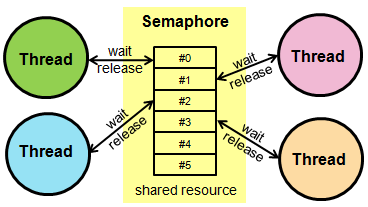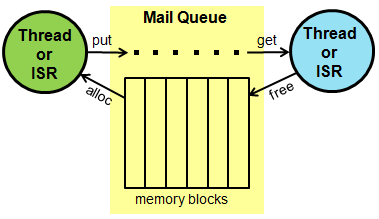You are viewing an older revision! See the latest version
CMSIS RTOS
RTOS
- mbed RTOS
- CMSIS RTOS
The CMSIS-RTOS is a common API for Real-Time operating systems. It provides a standardized programming interface that is portable to many RTOS and enables therefore software templates, middleware, libraries, and other components that can work across supported the RTOS systems.
Import librarymbed-rtos
Official mbed Real Time Operating System based on the RTX implementation of the CMSIS-RTOS API open standard.
Thread¶
The Thread Management function group allow defining, creating, and controlling thread functions in the system. The function main is a special thread function that is started at system initialization and has the initial priority osPriorityNormal.
[Not converted]
main
The main function is already the first thread scheduled by the rtos.
[Not converted]
Mutex¶
The Mutex Management function group is used to synchronize the execution of threads. This is for example used to protect access to a shared resource, for example a shared memory image.
ISR
Mutex Management functions cannot be called from interrupt service routines (ISR).

[Not converted]
C standard library mutexes
The ARM C standard library has already mutexes in place to protect the access to stdio, therefore on the M3 mbed the above example is not necessary. On the contrary, ARM microlib (used on the M0 mbed) does not provide default stdio mutexes making the above example a necessity.
printf in ISR
Because of the mutexes in the ARM C standard library you can not use printf in ISR!
Semaphore¶
The Semaphore Management function group is used to manage and protect access to shared resources. For example, with a Semaphore the access to a group of identical peripherals can be managed. The number of available resources is specified as parameter of the osSemaphoreCreate function.

[Not converted]
Signals¶
The Signal Management function group allow to control or wait signal flags. Each thread has assigned signal flags.
[Not converted]
Message Queue¶
The Message Queue Management function group allow to control, send, receive, or wait for messages. A message can be a integer or pointer value that is send to a thread or interrupt service routine.

[Not converted]
Memory Pool¶
[Not converted]
[Not converted]
Mail Queue¶
The Mail Queue Management function group allow to control, send, receive, or wait for mail. A mail is a memory block that is send to a thread or interrupt service routine.

[Not converted]
[Not converted]
Timer¶
The Timer Management function group allow creating and and controlling of timer functions in the system. A timer function is called when a time period expires whereby both on-shot and periodic timers are possible. A timer can be started, restarted, or stopped.
Timers are handled in the thread osTimerThread. Callback functions run under control of this thread and may use CMSIS-RTOS API calls.

[Not converted]
Interrupt Service Routines¶
The same CMSIS-RTOS can be used in ISR. The only two warnings are:
- Mutexes can not be used.
- Wait in ISR is not allowed: all the timeouts in method parameters have to be set to 0 (no wait).
[Not converted]
No wait in ISR
When calling an rtos object method in an ISR all the timeout parameters have to be set to 0 (no wait): waiting in ISR is not allowed.
Stack Configuration¶
The stack configuration is very dependent from the underling CMSIS-RTOS implementation.
As first reference implementation we are using RTX. One of the limitation of the RTX implementation is that it requires to statically configure the maximum number of threads and the size of the memory pool for their stacks.
This is our default configuration:
| mbed NXP LPC11U24 | mbed NXP LPC1768 | |
|---|---|---|
| Max number of user threads + (timer) | 3 + (1) | 7 + (1) |
| Default stack size in bytes | 0.5 Kb | 1 Kb |
configuration
To edit the configuration:
- Right-click the
rtoslibrary and select"Edit library...". - Modify
RTX_Conf_CM.cas needed.
Status and Error Codes¶
The Status and Error Codes section lists all the return values that the CMSIS-RTOS functions will return:
osOK: function completed; no event occurred.osEventSignal: function completed; signal event occurred.osEventMessage: function completed; message event occurred.osEventMail: function completed; mail event occurred.osEventTimeout: function completed; timeout occurred.osErrorParameter: parameter error: a mandatory parameter was missing or specified an incorrect object.osErrorResource: resource not available: a specified resource was not available.osErrorTimeoutResource: resource not available within given time: a specified resource was not available within the timeout period.osErrorISR: not allowed in ISR context: the function cannot be called from interrupt service routines.osErrorISRRecursive: function called multiple times from ISR with same object.osErrorPriority: system cannot determine priority or thread has illegal priority.osErrorNoMemory: system is out of memory: it was impossible to allocate or reserve memory for the operation.osErrorValue: value of a parameter is out of range.osErrorOS: unspecified RTOS error: run-time error but no other error message fits.
osEvent¶
The osEvent data structure is returned by get methods of Queue and Mail objects.
This data structure contains both an error code and a pointer to the actual data:
[Not converted]
